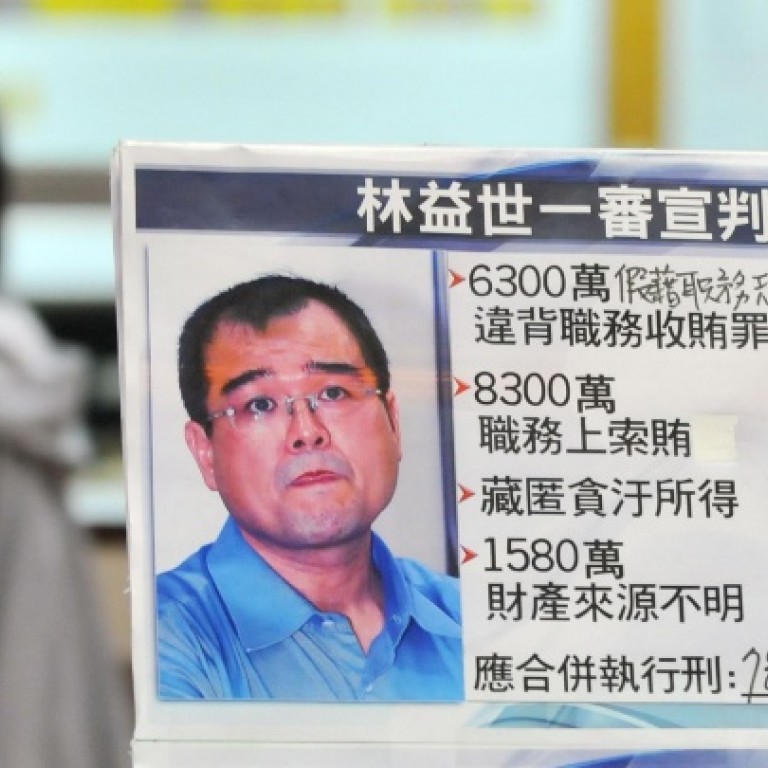
Questions over impartiality of judicial system in Taiwan
A light sentence for a former presidential aide in a graft scandal that was widely criticised should be cue for considering trial by jury
The recent acquittal of a former top aide of Taiwanese President Ma Ying-jeou on corruption charges has been widely criticised by the media and the public, with fresh concerns raised about the long disputed impartiality of the island's judicial system.
Lin Yi-shih, a former cabinet secretary general, close confidant of Ma and suspect in a high-profile graft scandal, was instead found guilty of extortion and failing to explain the source of his wealth.
We cannot satisfy everyone's expectations and rule that the defendant was guilty of corruption just because of pressure from society
On April 30, the Taipei District Court sentenced him to 71/4 years in jail, much less than the life sentence sought by prosecutors.
In an indictment issued in March, Lin was described as a "wolf preying on villagers" who allegedly demanded NT$63 million (HK$16.56 million) in bribes from a businessman in 2010, while serving as a legislator.
The indictment said Lin demanded the money from Chen Chi-hsiang, who wanted to secure a slag treatment contract from China Steel in Kaohsiung, southern Taiwan. The island's government holds a controlling stake in the Taiwan-listed steelmaker.
Last year, when Lin was cabinet secretary general, he allegedly demanded another NT$83 million from Chen, who refused to pay up and instead exposed the case to Taiwanese media in June. That led to an investigation by prosecutors and Lin's arrest in July.
An edited version of an audio recording of Lin's second demand, secretly taped by Chen, was provided as part of the evidence by prosecutors during the trial.
While most expected Lin to be convicted of corruption, the court ruled that he had not demanded a bribe from Chen and had instead extorted money from him.
In its verdict, the court said that even though Lin was a legislator at the time, he was not powerful enough to force China Steel to award the contract to Chen. It said Lin had merely "used the personal influence he had long built in his home base in southern Taiwan" to threaten the businessman, who, in turn, promised to give him the money as a "service charge".
The verdict did not explain why the steelmaker awarded the contract to Chen.
In relation to Lin's second demand for money, the court said Chen had not given Lin the money he demanded and that Chen had edited the recording of Lin's demand, making it inadmissible as evidence. It said prosecutors had also failed to prove that Lin had used his position as cabinet secretary general to demand bribes from Chen.
Lin was found guilty of violating the law on unexplained wealth because he could not explain why his assets were NT$63 million more than he had previously declared.
In addition to his jail sentence for extortion and failing to explain the source of his wealth, he was also fined NT$15.8 million.
The relatively light sentence led to a public outcry, with calls for Ma to live up to repeated promises to keep his government clean.
Led by the pro-independence Democratic Progressive Party, the opposition camp cried foul, saying the ruling helped extricate Ma from a political predicament and likened Lin's behaviour to a slap in Ma's face.
The image of Ma and his government was badly tarnished when the graft scandal broke last year, and the trial has now cast a further pall over the government's reputation.
Former Taiwanese president Chen Shui-bian, in jail after being convicted of corruption, accused the Ma government of having double standards.
Chen Shui-bian was found guilty of accepting bribes from a businesswoman who wanted to secure the chairmanship of a financial institution, and for interfering in a land transaction. In those two cases, the supreme court ruled that he had explicitly used the office of president to make illicit gains.
Almost all Taiwanese media, regardless of their political stance, ran editorials or commentaries criticising the verdict on Lin.
Internet users and even some legislators from the ruling Kuomintang joked that the verdict set a legal precedent for Taiwanese legislators and government officials to demand funds from others without needing to worry about being charged with corruption.
District Court Judge Wu Chiu-hong said that while the verdict might have been very different from what people had expected, "we cannot satisfy everyone's expectations and rule that the defendant was guilty of corruption just because of pressure from society".
Although Wu might have a point, the court failed to recognise that a legislator has the power to question and cut the annual budgets of government offices and public enterprises.
Although China Steel is a listed company, the government's controlling stake means it has to listen to the government.
Prosecutors intend to appeal against the verdict and it could be overridden by the high court.
But Taiwanese authorities should conduct a thorough review of the judicial system to see whether it is fair enough to convince most people that justice is being done.
And it's about time that Taiwan thought seriously about introducing jury trials, in place of trials by judges alone.

